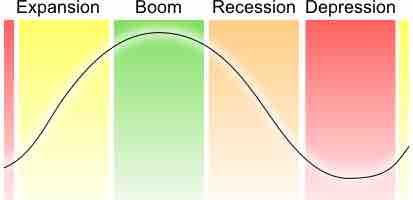The Business Cycle
The term "business cycle" (or economic cycle or boom-bust cycle) refers to economy-wide fluctuations in production, trade, and general economic activity. From a conceptual perspective, the business cycle is the upward and downward movements of levels of GDP (gross domestic product) and refers to the period of expansions and contractions in the level of economic activities (business fluctuations) around a long-term growth trend .

Business Cycles
The phases of a business cycle follow a wave-like pattern over time with regard to GDP, with expansion leading to a peak and then followed by contraction leading to a trough.
Business Cycle Phases
Business cycles are identified as having four distinct phases: expansion, peak, contraction, and trough.
An expansion is characterized by increasing employment, economic growth, and upward pressure on prices. A peak is realized when the economy is producing at its maximum allowable output, employment is at or above full employment, and inflationary pressures on prices are evident. Following a peak an economy, typically enters into a correction which is characterized by a contraction, growth slows, employment declines (unemployment increases), and pricing pressures subside. The slowing ceases at the trough and at this point the economy has hit a bottom from which the next phase of expansion and contraction will emerge.
Business Cycle Fluctuations
Business cycle fluctuations occur around a long-term growth trend and are usually measured by considering the growth rate of real gross domestic product.
In the United States, it is generally accepted that the National Bureau of Economic Research (NBER) is the final arbiter of the dates of the peaks and troughs of the business cycle. An expansion is the period from a trough to a peak, and a recession as the period from a peak to a trough. The NBER identifies a recession as "a significant decline in economic activity spread across the economy, lasting more than a few months, normally visible in real GDP, real income, employment, industrial production. " This is significantly different from the commonly cited definition of a recession being signaled by two consecutive quarters of decline in real GDP.